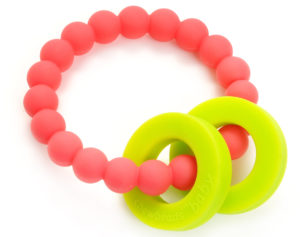 Uh oh....A recent study found that every baby teether tested (and they tested 59 teethers), including all those labeled "BPA free", leached various parabens, bisphenols (including BPA or bisphenol A), and other endocrine disrupting chemicals. Infants chew and suck teethers to soothe the pain from their teeth emerging in the first year of life.
Uh oh....A recent study found that every baby teether tested (and they tested 59 teethers), including all those labeled "BPA free", leached various parabens, bisphenols (including BPA or bisphenol A), and other endocrine disrupting chemicals. Infants chew and suck teethers to soothe the pain from their teeth emerging in the first year of life.
The researchers tested for 26 chemicals in three different types of teethers (solid plastic, gel-filled, and water-filled), and found parabens and bisphenols leaching from all of them. To see what leaches from the teethers, they placed the teethers into water - this is similar to what happens when babies mouth teethers and their saliva is exposed to chemicals in the teethers. The gel filled teethers leached the most chemicals overall. Even though 48 of the 59 teethers were labeled “BPA-free,” the results showed that the labels were misleading, because in this study BPA migrated (leached out) from all the teethers.
Endocrine disrupting chemicals can interfere with natural hormone function and are linked to a wide assortment of health problems (see posts on them). Even though the levels of the chemicals found were low, it is important to remember that effects from endocrine disrupting chemicals (hormone disruptors) are from very low levels. So exposing developing infants to these chemicals is of concern. What was disturbing is that these study results were far worse than a small study of teethers in Europe where the standards regarding endocrine disrupting chemicals are stricter than in the US. What should be done? Manufacturers should design products without using problem ingredients right from the start. Problem solved! From Science Daily:
Baby teethers soothe, but many contain low levels of BPA
Bisphenol-A (BPA), parabens and antimicrobials are widely used in personal care products and plastics. The U.S. and other governments have banned or restricted some of these compounds' use in certain products for babies and kids. But the compounds' presence in and leaching from teethers hasn't been thoroughly investigated. Now a study in the ACS journal Environmental Science & Technology reports that all tested plastic teethers contained BPA and other endocrine-disruptors that leached at low levels.
Studies have shown that in animals, endocrine-disrupting compounds (EDCs) -- which include BPA, parabens and antimicrobials -- can potentially interfere with hormones and have harmful developmental, reproductive and neurological effects. As a result, the European Commission in 2011 restricted the use of BPA in baby bottles. The U.S. followed suit a year later, banning it from baby bottles, and also from children's drinking cups....But very few if any studies have investigated whether the compounds are used to make teethers and if the compounds leach out of these products, which are designed to soothe babies' gums when their teeth come in. Kurunthachalam Kannan and colleagues wanted to see if the products contained EDCs and if the compounds could migrate out.
The researchers analyzed 59 solid, gel-filled or water-filled teethers purchased online in the U.S. for 26 potential endocrine-disrupting chemicals. Although most of the products were labeled BPA-free or non-toxic, all of them contained BPA. In addition, the researchers detected a range of different parabens and the antimicrobials triclosan and triclocarban in most of the teethers....Based on estimates of average use time and the body weight of a 12-month-old baby, calculations suggest that exposure to BPA and other regulated EDCs in teethers would be lower than the European standards for temporary tolerable daily intake levels. However, these thresholds are set for individual compounds. Current regulations do not account for the accumulation of multiple EDCs, note the researchers. Additionally, not all chemicals measured in the study are regulated.
